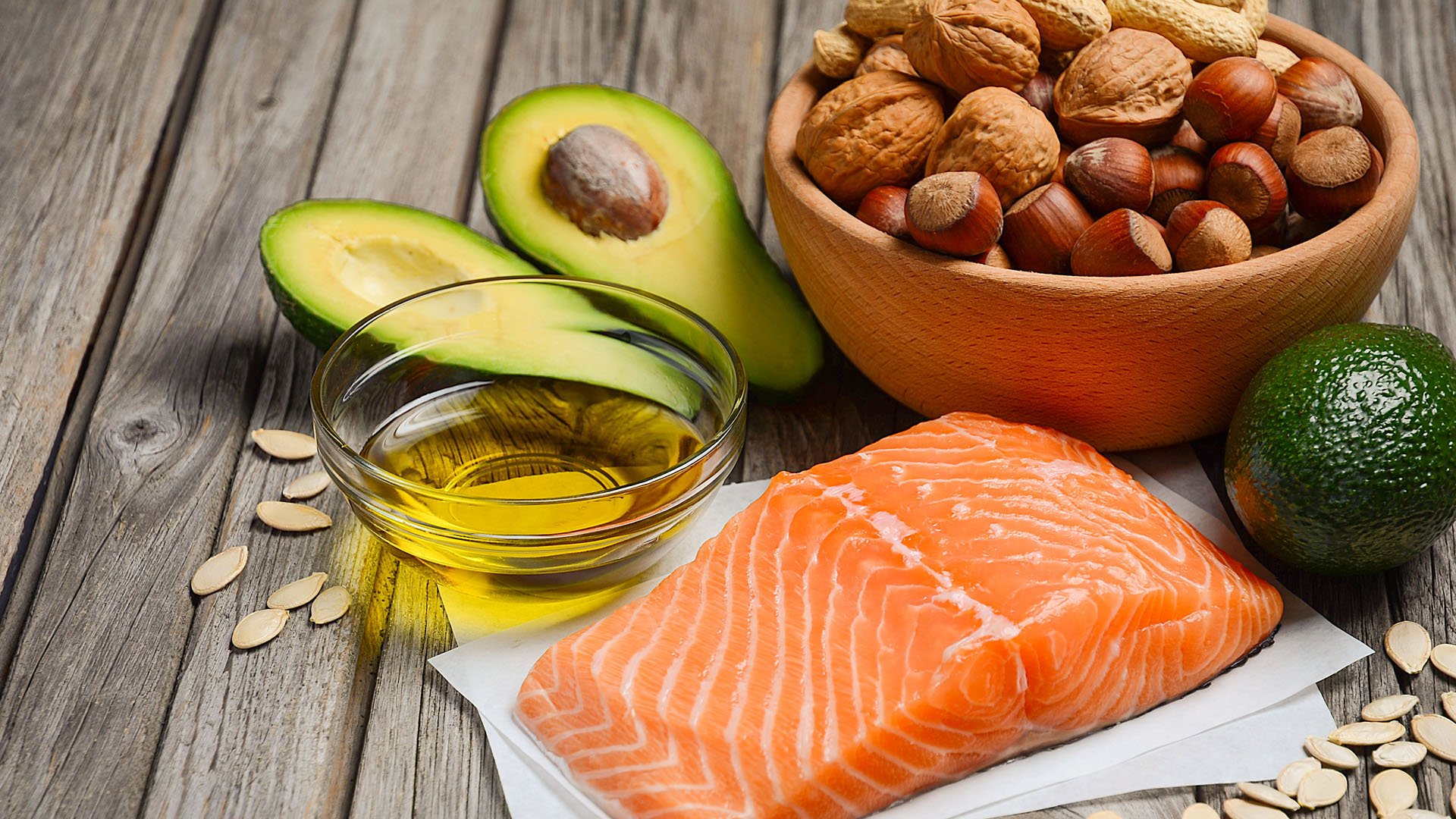You need a small amount of fat in your diet for healthy functioning. Oils and fats supply calories and essential fats and help your body absorb fat-soluble vitamins such as A, D, E and K. The type of fat is just as important for health as the total amount of fat consumed. That's why it's important to choose healthier unsaturated fats. Eating too much and the wrong kinds of fats, such as saturated and trans fats, may raise unhealthy LDL cholesterol and lower healthy HDL cholesterol. This imbalance can increase your risk of high blood pressure, hardening of the arteries (atherosclerosis), heart attack and stroke.
Monounsaturated fats
Monounsaturated fats have been shown to improve blood cholesterol levels. They're found in:
- olive oil
- canola oil
- peanut oil
- non-hydrogenated margarine
- avocados
- some nuts (almonds, pistachios, cashews, pecans and hazelnuts).
Polyunsaturated fats
Polyunsaturated fats can lower bad cholesterol levels (LDL cholesterol). One type is omega-3, which can help prevent clotting of blood, reducing the risk of stroke and also helps lower triglycerides, a type of blood fat linked to heart disease. The best sources of omega-3 fat are:
- cold-water fish (mackerel, sardines, herring, rainbow trout and salmon)
- canola and soybean oils
- omega-3 eggs
- flaxseed
- walnuts
- pecans
- pine nuts.
Another type of polyunsaturated fat is omega-6. It helps lower LDL cholesterol, but in large amounts it's thought to also lower the good HDL cholesterol. Eat it in moderation. Omega-6 is found in safflower, sunflower and corn oils, non-hydrogenated margarine and nuts such as almonds, pecans, brazil nuts and sunflower seeds. It is also in many prepared meals.
Saturated fat
Saturated fat can raise bad (LDL) cholesterol. LDL cholesterol is a risk factor for heart disease and stroke. Emerging evidence suggests that saturated fats might affect your health differently depending on the food source of the saturated fat. Canada’s Food Guide recommends a shift towards more plant-based foods to help reduce the amount of saturated fat you eat.
Foods high in saturated fat include:
- fatty meats
- full-fat dairy products
- butter
- hard margarines
- lard
- coconut oil
- ghee (clarified butter)
- vegetable ghee
- palm oil.
But highly and ultra-processed foods are a major source of saturated fats in the Canadian diet. These foods have many ingredients and go through complex changes in a factory so the food doesn’t look like its original source. Highly processed foods include:
- hot dogs
- burgers
- deli meats
- cookies
- donuts
- cakes
- chips
- French fries
- other snack foods.
By limiting these highly processed foods, the amount of saturated fat you eat will decrease, as well as sugar, sodium and trans fats. Read more about highly processed foods.
Trans fat
Since September 2018, the addition of trans fat to food products has been banned by the Canadian government.
Artificial trans fat was a type of fat that was added to some food products to improve taste and texture and extend their shelf life. However, trans fats can increase your risk of heart disease by increasing your unhealthy LDL cholesterol and decreasing your healthy HDL cholesterol.
Heart & Stroke played a key role in eliminating artificial trans fats from the Canadian food supply.
How much fat should you eat in a day?
The type of fat consumed is more important than the amount of fat consumed.
The intention is not to reduce total fat in the diet. Rather, it is to help reduce intakes of saturated fat, while encouraging foods that contain mostly unsaturated fat.
Focus on a healthy balanced diet of vegetables and fruit, whole grains, and protein from a variety of sources such as legumes, nuts, lower-fat dairy and alternatives, lean meats, and fish. Limit how many highly processed foods you eat. Look at the big picture rather than fat alone. By limiting highly processed foods and choosing whole, natural foods, especially more plant-based foods, you reduce the amount of saturated fat in your diet.
The amount of fat a child or adolescent needs depends on their height, build, gender and activity level. Young children need a slightly higher amount of fat for growth and development, but the need decreases as they grow older.
What is dietary cholesterol?
The liver makes about 80% of the cholesterol in your body. The other 20% comes from the foods you eat. The foods that raise your blood cholesterol the most are high in saturated fat, like: fatty meat and whole-fat dairy products, snack foods and some ready-prepared foods. Foods that have high levels of dietary cholesterol include:
- egg yolks
- shrimp
- squid
- organ meats and fatty meats.
Dietary cholesterol only has an effect in some people. From a nutrition perspective, the best way to control blood cholesterol is to eat a healthy diet that is lower in fat, especially saturated and trans fat. Studies show that for healthy people with no history of heart disease, diabetes or high blood cholesterol, eating an average of one egg per day (or seven eggs per week) does not increase the long-term risk of heart disease.
If you eat a healthy, balanced diet of whole/natural foods and few or no highly processed foods as well as follow the recommended serving sizes, saturated fat intake should not be an issue.
If you have heart disease or diabetes, speak to your healthcare provider about what recommendations for cholesterol and fat intake apply to you.
Read more about how to lower your cholesterol.
Related information
Find heart-healthy recipes.
Learn more from Health Canada about fats to include in your diet and which high saturated/ trans fat foods to limit.
